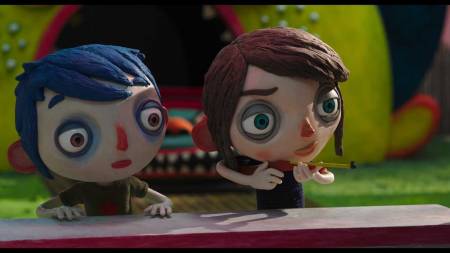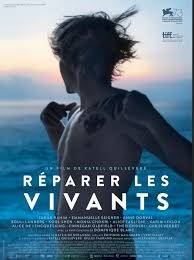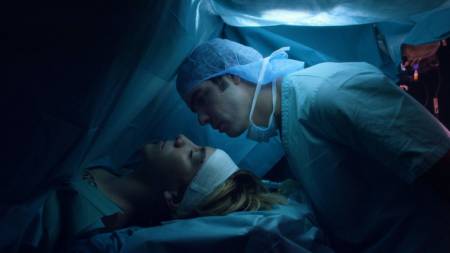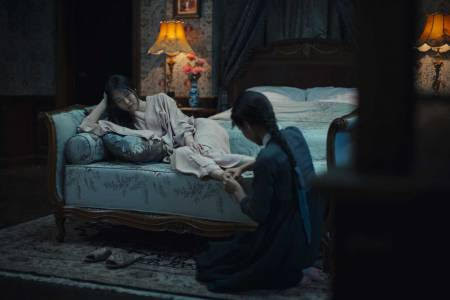-
CLAUDE BARRAS: MA VIE DE COURGETTE/MY LIFE AS A COURGETTE (2016)

COURGETTE AND CAMILLE IN MA VIE DE COURGETTE
Tough kids
This stop-motion animated film from the Swiss director Claude Barras is about little kids, but is it for little kids? Its treatment of a group in a foster care center who've encountered hard knocks early on could build sensitivity among youngsters, but their parents might not want them to see it. It delivers a parallel and engaging message. Just as we the viewers surprise ourselves by how fond we grow of young critters who look like big-eyed rag dolls, the kids they represent, with little to go on in previous knowledge or experience of love, develop deep loyalty and affection toward each other in the film's short but emotionally intense 70-minute run time.. All this is thanks to Barras' fortunate collaboration on the writing with the 36-year-old Céline Sciamma, whose three films thus far as a writer-director, Water Lilies/Naissance des pieuvres (2007), Tomboy (2011), and Girlhood/Bande de filles (2014) has each in its different way shown a fresh, bold way of looking at the experience of youth. (Sciamma's contribution as a writer has just been seen in André Téchiné's strong new gay coming-of-ager, Being 17/Quand on a 17 ans.) Here she is adapting a novel by Gilles Paris.
Icare (Icarus, voiced by Gaspard Schlatter) is a 9-year-old who prefers his nickname "Courgette" (aubergine, zucchini). He lives with his alcoholic sigle mother, until he causes her accidental death, and he is taken by a kindly, mustachioed policeman called Raymond (Michel Vuillermoz), to the orphanage. We feel keenly the loneliness and strangeness of the first hours there, the first, sleepless, night. He is mercilessly teased by others, led by Simon (Paulin Jaccoud). Simon's rag-doll face is the most interesting. Its sharp angularity seems cruel, and then reflects vulnerability. It soon becomes clear the kids share very similar experiences of deadbeat, druggie, alcoholic and absent parents.
Barras and Sciamma don't make the foster center a harsh place. Just being there is hard enough for these lost children. Every minute there, and on a brief trip to the mountains, is a time of intense learning and change for the kids. Simon razzes Courgette and insists on calling him "Potato." When the moment comes that he uses "Courgette," it's a big coming together. Then comes the arrival of Camille, whom Courgette falls for. Again the bonding owes a lot to sharing similar, grim backgrounds. Things get more complicated when an evil aunt wants to adopt Camille, and the sweet Raymond first visits, then wants to adopt, the children.
As Boyd van Hoeij says in his Cannes review for [URLf="http://www.hollywoodreporter.com/review/my-life-as-a-courgette-891734"] Variety[/URL], given that the kids' "faces are made of plasticine, what Barras has achieved here is nothing short of a miracle." There is nothing like the complicated mise-en-scène of the Belgian stop-motion Panique au villageof Stéphane Aubier and Vincent Patar, but somehow we're immediately drawn in emotionally and it stays that way. It's almost as if the more blatantly unreal the scenes and critters are, how simple and minimal the settings, the more we identify and care. Some of the vivid, delicately particularized experience depicted here is sure to stay with you.
Ma vie de courgette/My LIfe As a Courgette, 66 mins., debuted 15 May 2016 in Directors Fortnight at Cannes; close to a dozen other festivals including Annecy and Angoulême. French theatrical release 19 Oct.: rave reviews (AlloCiné press rating 4.5 based on 30 critiques). Screened for this review at MK2 Odéon Hautefeuille 28 Oct. 2016. There were some little kids brought to the early show; I wondered how it went for them. Probably fine. They're tougher than we know; that's what the film itself is telling us. And as van Hoeij points out this is ultimately a happy movie that ends with sunshine.
Last edited by Chris Knipp; 01-02-2017 at 09:03 AM.
-

Coming next week in Paris.
Two films coming to Paris cinemas in a couple days look like must-sees: Katell Quilleveré's Réparer les vivants/Heal the Living and Park Chan-wook's Mademoiselle/The Handmaiden. Both have been widely publicized.
Réparer les vivants , which debuted recently at Venice, is a double narrative about the death of a young surfer and the patient who's going to receive his heart in a transplant operation; it's adapted from a novel by Maylis de Kerangal.
The Handmaiden, which was in Competition at Cannes, is a swoony, stylized and gorgeous-looking potboiler (an "erotic psychological thriller," they are calling it) that is a bit of a change for the director of Oldboy and the Vengeance series.

Last edited by Chris Knipp; 10-30-2016 at 06:26 AM.
-
RÉPARER LES VIVANTS/HEAL THE LIVING (Katell Quillévéré 2016)

GABIN VERDET AND TAHAR RAHIM IN RÉPARER LES VIVANTS
It all comes together
Katell Quillévéré's third feature adapts Maylis de Kerangal’s bestselling French novel (Heal the Living), a humanistic medical thriller about events leading up to a heart transplant. It begins with Simon (Gabin Verdet), the bleach-blond surfer boy whose car accident makes him brain dead and his perfect organs available for replacing others' failing ones, if his devastated parents, Marianne and Vincent (Emmanuelle Seigner and Kool Shen) are willing. Meanwhile there are closeups of the medical professionals involved, young cardiologist Thomas Rémige (Tahar Rahim) and his master Docteur Pierre Révol (Bouli Lanners) and nurse Jeanne (Monia Chokri). Then we observe Claire (Anne Dorval of Xavier Dolan's Mommy), the lady who is to receive Simon's heart, a lesbian classical pianist and motehr of two college-age sons (Finnegan Oldfield, Théo Cholbi) whose heart's days are numbered.
Like Tell No One, a French version of an American crime story way better than Hollywood could do it, this is a ridiculously vivid, clear, humanistic and tasteful version of what seems the most conventional US TV medical drama material, and you cannot but admire it, while in the back of your mind still wondering, why did she bother? Quillévéré's leap forward as a director of complex, demanding movie dramas - with more budget and more name cast members - is also a step back out of the raw indie territory she inhabited in her first two movies into a safer, more mainstream, even if demanding, work.
But it's still an ambitious, complex film, and not only does she never slip into the saccharine territory that the material threatens to draw her into, but she provides some lovely touches, while the whole fits together impeccably.. The opening passage when Simon leaves his girlfriend Juliette (Galatea Bellugi) in the wee hours, leaping out the window, races a pal, suits up and surfs - water sequence magnificently shot to show both perfect marriage with the waves and threat of death. Then the fatal drive, turned into a sea death as sleepiness of all three youths makes the road and horizon fade into soft waves, the crash just a bang, no messiness. This whole Simon passage, a model of its kind, is of a sublime simplicity and physicality, delivering nothing but a sense of youth, health, and impermanence. The only further development of Simon is equally physical: to seduce Juliette at first meeting, he successfully races her rail car with his bike, leaps over his bike in a move I've never seen, climbs up breathless to the platform, and they kiss.
Later, the film gets equally intimate in a lower key in following Claire as she interacts with her concerned sons Maxime (Oldfield) and Sam (Cholbi) and attends a piano concert by her beautiful protégée and former lover Anne Guérande (actress and pianist Alice Taglioni). She also meets with her cardiologist, who will perform the translpant; Drs. Rémige and Rémol will remove Simon's heart. Claire's scenes require a refocusing effort from the audince after the intensity of the earlier passages, all of them at a high pitch further heightened by Alexandre Desplat's piano-based score. The presence of the well-known French movie composer is a sign of the glossier production, but Thomas Marchand, the editor, whose presence is more essential, was present on the director's first two films. Claire's sequences apparently add to a barely outlined character in the novel, and they're still relatively flat after the vivacity and invention of Simon's sequences and the high pitched emotions of his parents' grieving. A turning point in the film, and a key to its humanism, comes when Marianne and Vincent, still in great grief, come to accept the goodness of allowing their son to be an organ donor.
The still boyish Rahim, who gently elicits this decision, is a good choice for exuding human kindness, and the film's best moment and best evocation of the magic of the medical miracle this story is about comes when he carries out a ritual farewell to Simon in the operating room following the boy's parent's directives, and it's at this moment that this tasteful and economical film indulges in its one repeat sequence, Juliette's tearful face in the light of dawn and Simon's leap out her window: rhythmical repetition, a joining of the circle, death and life.
Still, for all this beauty, though may not miss the oddness of the director's debut Love Like Poison, one does miss a bit the wildness and emotional extremity of her sophomore effort, Suzanne, which also put Adèle Hanel on the map. What Réparer les vivants, heavily publicized in France and widely distributed there, does do, is show that Quillévéré is a directorial talent both recognized and worth continuing to follow.
Réparer les vivants/Heal the LIving, 105 mins., debuted at Venice Sept. 2016, also showing at Toronto and London. French theatrical release bega 1 Nov. 2016. Screened for this review at UGC Danton, Paris, 1 Nov. 2016.
Last edited by Chris Knipp; 02-17-2017 at 02:17 PM.
-
PARK CHAN-WOOK: HANDMAIDEN/MADEMOISELLE (2016)

KIM MIN-HEE AND KIM TAE-RI IN HANDMAIDEN
Park Chan-wook's elaborate soft-core lesbian romance
Park Chan-wook's new film, Handmaiden (presented in France as Mademoiselle), is a startling change of pace for the director of Oldboy and Lady Vengeance, though as over-the-top as ever. A free adaptation of the Welsh writer Sarah Water's period crime novel Fingersmith, it's a baroque, erotic, elaborate period piece set in Thirties Korea under Japanese occupation, that's also a treasure trove of narrative twists and turns.
The original story concerns a Victorian girl pickpocket brought up among thieves in Southwark under the bridge, who is sent by a scam artist known as "Gentleman" to deceive an heiress who stands to inherit a fortune from the old uncle in whose dark mansion she lives. Gentleman has already gained the heiress' confidence but wants the girl to help him move in on her, marry her, and dump her in an insane asylum, pocketing the fortune for himself, giving the girl a percentage.
The reviewer in the Gardian, while reveling in Waters' book's divertingly lurid melodrama worthy of Wilkie Collins, acknowledges it could "perhaps have been edited a little." The same is true of Handmaiden, which seems to contain many of the accoutrements of Fingersmith - the lesbian romance that develops between girl and mistress, the gloves and rustling fabric, the plotting and betrayals - with a lot more overt sex and some sadistic violence tossed in at the end, as well as a somewhat excessive series of revisits to the early action to show us what really happened, much of which is unnecessary and condescending and helps explain the film's considerable length (2 1/2 hours).
The action is claustrophobic and repetitive to a point that is wearisome, but the film beautiful and erotic - if not as much as it could be of either. The mise-en-scène is ornate (the heavy, posh period interiors, the women's dresses), but the images don't have quite the gloss and high color one expected. The lesbian love scenes are juicy but abrupt, rather than slow-burns.
Nonetheless some things are undeniable fun. The two attractive young actresses do throw themselves into things. The pale and differently lovely servant-crook Sook-hee (Kim Tae-ri) and her new mistress, Lady Hideko (Kim Min-hee) are teasing eye-candy, and it's intriguing to see them gradually come together and exchange characteristics - and body fluids.
Park has said his pleasure in transferring the action to Thirties Korea was to comment on the Japanese occupation, and even linguistically handicapped westerners can appreciate the constant switches back and forth between Korean and Japanese because they are indicated by white subtitles for the former and yellow ones for the latter. Korean is the occupiers' language and also the language of the poseur. The scam artist who brings in the orphan pickpocket Sook-hee (Kim Tae-ri) calls himself Count Fujiwara, but is really Korean (Ha Jung-woo). The heiress, Lady Hideko (Kim Min-hi) is living with her Korean uncle-by-marriage, Kozuki (Cho Jin-woong), a creep who collects erotic books and fetishizes Japanese culture. Lady Hideko turns out to know Korean too, and of course "Count Fujiwara" is constantly switching back and forth. We can see political resentments and class tensions blending with personal insecurity and neuroticism: Lady Hideko is partly crazy, or so it seems. Meanwhile, following the book, the film is in three parts, with identify and point of view shifts with each part to undercut what we thought was happening.
Despite shrewd observations on class and gender, it's hard not to see Park as ramping up shock value as he always has, made to seem smarmy and less crass simple fun due the the genteel element of costume romance. But it's been argued by some critics, with some reason, that any claims that this is retro and sexist stuff are offset by the fact that the triumphant lovers are women, and the various men are all useless and annoying. In the end it's a tossup whether this is a cinematic masterpiece of a load of bull crap. As always Park is a gifted filmmaker, though he may be running out of native ideas a bit, and finally Handmaiden will fit in at the lower end of his distinctive cult films and is certainly not one of his flops.
Handmaiden/Mademoiselle/아가씨, debuted at Cannes in Competition May 2016; two dozen other international festivals. Limited US release 21 Oct., official release in France 1 Nov. 2016. Screened for this review at MK2 Odéon, Paris 1 Nov. Metacritic rating 84%; AlloCiné press rating 4.0 from 20 reviews.
Last edited by Chris Knipp; 11-01-2016 at 03:58 PM.
-
Chris, thanks for the reviews from Paris. Not a bad deal, traveling and enjoying the best movies, and sharing your adventures here. I watched The Handmaiden and enjoyed the spectacular style as much as his other equally shallow films, more or less. Looking forward to new films by Ozon and especially the Dardennes. Recently I liked Techine's Being 17 a lot. The traveling shot that opens the film and accompanies the credits is breathtaking; performances were superb. Well, keep those reviews coming.
-
Thank you, Oscar, for the feedback. I'd agree on Being 17. Another one to look for besides those you mention is Maren Ade's Toni Erdmann. And how about the new Jodorowsky? Aquarius, have you seen that? And Moonlight, which I saw in New York before coming to Paris.
-
Last edited by Chris Knipp; 11-03-2016 at 07:13 PM.
 Posting Permissions
Posting Permissions
- You may not post new threads
- You may not post replies
- You may not post attachments
- You may not edit your posts
-
Forum Rules





 Reply With Quote
Reply With Quote




Bookmarks